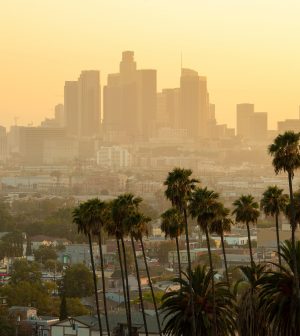- Could Your Grocery Store Meat Be Causing Recurring UTIs?
- Are You Making This Expensive Thermostat Error This Winter?
- Recognizing the Signs of Hypothyroidism
- 10 Strategies to Overcome Insomnia
- Could Artificial Sweeteners Be Aging the Brain Faster?
- Techniques for Soothing Your Nervous System
- Does the Water in Your House Smell Funny? Here’s Why
- Can a Daily Dose of Apple Cider Vinegar Actually Aid Weight Loss?
- 6 Health Beverages That Can Actually Spike Your Blood Sugar
- Treatment Options for Social Anxiety Disorder
Polluted Air Linked to Dangerous Antibiotic Resistance

Doctors who overprescribe antibiotics are often blamed for medication-resistant illnesses, but new research points to another potential culprit: air pollution.
Controlling air pollution could reduce antibiotic resistance, greatly reducing deaths and economic costs, according to a new in-depth global analysis were published Aug. 7 in The Lancet Planetary Health..
“Antibiotic resistance and air pollution are each in their own right among the greatest threats to global health,” said lead author Hong Chen, a professor at Zhejiang University in China.
“Until now, we didn’t have a clear picture of the possible links between the two, but this work suggests the benefits of controlling air pollution could be twofold: Not only will it reduce the harmful effects of poor air quality, it could also play a major role in combatting the rise and spread of antibiotic-resistant bacteria,” Chen said in a journal news release.
Some potential pathways include hospitals, farms and sewage-treatment facilities that emit and spread antibiotic-resistant particles through the air and across distances, the study found.
Evidence suggests air pollution contributes to the spread of this antibiotic-resistant bacteria, according to the study.
Sources of air pollution called PM2.5 include industrial processes, road transportation and domestic coal and wood burning.
About 7.3 billion people globally are directly exposed to unsafe average annual PM2.5 levels. About 80% of those people live in low- and middle-income countries, the researchers noted.
They found that antibiotic resistance increased with PM2.5. Every 1% rise in air pollution was linked with increases in antibiotic resistance of between 0.5% and 1.9%, depending on the pathogen.
This association strengthened over time, with changes in PM2.5 levels leading to larger increases in antibiotic resistance in more recent years.
For the study, the authors used data for 116 countries from 2000 to 2018. The analysis included data on more than 11.5 million test isolates, covering nine bacterial pathogens and 43 types of antibiotics.
The study found that the highest levels of antibiotic resistance were in North Africa, the Middle East and South Asia. Levels in Europe and North America are low.
The analysis suggests that antibiotic resistance resulting from air pollution was linked to an estimated 480,000 premature deaths in 2018, with additional economic costs of $395 billion.
Without changes to current policies on air pollution, by 2050 the levels of antibiotic resistance worldwide could increase by 17%, according to models created by the researchers. The annual premature death toll linked to antibiotic resistance would rise to around 840,000, with sub-Saharan Africa hit hardest.
However, implementing a WHO-recommended policy of limiting PM2.5 to 5 micrograms per cubic meter of air (μg/m3) in the atmosphere could decrease global antibiotic resistance by 17% by 2050, the authors found.
This policy could lead to a 23% reduction in premature deaths linked to antibiotic resistance worldwide and annual economic savings of $640 billion, according to the study.
More information
The U.S. Environmental Protection Agency has more on PM2.5.
SOURCE: The Lancet Planetary Health, news release, Aug. 8, 2023
Source: HealthDay
Copyright © 2026 HealthDay. All rights reserved.










